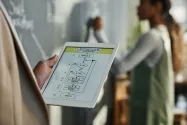These guidelines are supposed to be a first starting point when dealing with interoperability assessments. Some additional resources are already available. Others are in development or will be developed in the coming months. This chapter provides a short overview of the available and future resources and ends with a short elaboration on the future development of the guidelines.
6.1 Constitution of sound governance
-
Interoperable Europe portal:
The Interoperable Europe portal is the central point for knowledge exchange, both for the IEA in general and for specific topics (e.g. interoperability assessments and even individual interoperability solutions).
-
EIF:
The European Interoperability Framework is the guiding document on interoperability of public services in the EU. A fundamental feature of the EIF is that it defines interoperability not only as a technical issue but also as an issue that consists of four dimensions (legal, organisational, semantic and technical). It makes 47 recommendations around 12 principles and its further development will be steered by the Interoperable Europe Board. A short overview can be watched here: New European Interoperability Framework.
-
EIF Toolbox
The EIF Toolbox has been designed to be guidance for national public administrations and to equip them with the tools they need to align their NIF with the EIF in order to promote interoperability at national and EU level. You can also find solutions grouped by principles.
-
Better Regulation Guidelines and Better Regulation Toolbox
The Better Regulation Guidelines set out the principles that the Commission follows when preparing new initiatives and proposals, and when managing and evaluating existing legislation. The Guidelines apply to each phase of the legislative cycle. They are accompanied by the Better Regulation Toolbox, which puts the guidelines into practice and presents guidance, tips and best practices.
-
Interoperable Europe Academy
The Interoperable Europe Academy (IOPEU Academy) is an educational initiative promoted by the Commission. Its main objective is to boost public administrations’ advanced digital skills in the interoperability field. It does this by offering online, self-paced massive open online courses (MOOCs) (including courses on interoperability in general, the EIF and the European Interoperability Reference Architecture).
6.2 Future tooling
Online tools provided by the Commission , which are to be used voluntarily, can assist in carrying out the interoperability assessment, and in producing and publishing the corresponding report. It is highly recommended to use the Commission’s tools because they will also be embedded in the wider context of the Interoperable Europe portal where the reports are published – thus making them accessible to more stakeholders (such as public organisations) and thereby increasing mutual learning and reuse of data, concepts and solutions. If you want to contribute to the development of these tools by sharing your experience and ideas, you could consider joining the workshops promoted on the Interoperable Europe portal (e.g. the Interoperable Europe Portal user group meetings).
6.3 Future development of guidelines
This current edition of the guidelines is intended to guide you not only in conducting the assessments themselves but also in setting up the assessment processes and including them in your existing processes. The assessments have not yet become mandatory, so we cannot say for certain what these processes will look like in your particular case. The guidelines will therefore continue to evolve, adapting to the new circumstances once the assessments have become mandatory, i.e., the first assessments have been conducted and we can learn about them in your reports. We therefore encourage you to document your experience not only in following the guidelines but also with carrying them out, and to let us have your feedback. You can do so by joining our collection on the Interoperable Europe Portal, where you can always find the latest version of the guidelines and additional useful information, and where you can join discussions with other practitioners.
Your experiences will, together with the feedback gathered from the Interoperable Europe Board and its working groups, help us produce the next edition of these guidelines. Assessments can vary greatly in scope and objectives and the guidelines should reflect current practices. The guidelines will therefore be frequently revised so that they remain as relevant and useful as possible.





